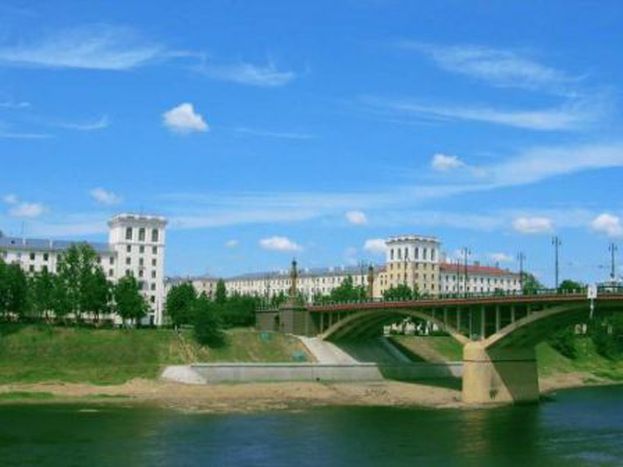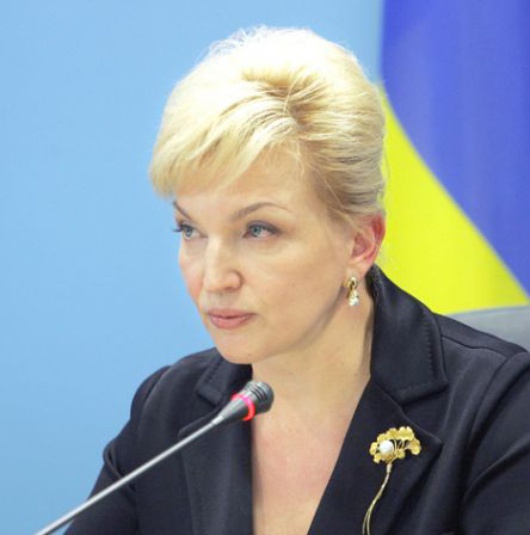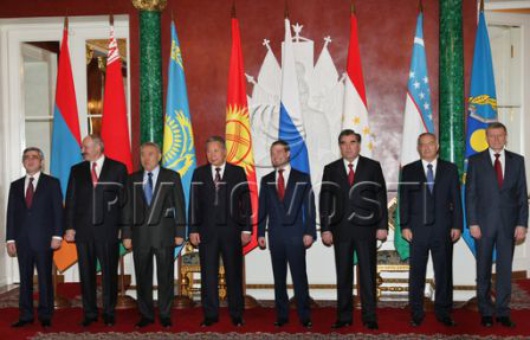
EU-Belarus-Russia: Mediating Maneuvers of Belarus
Published on
© Grundig, Minsk Cafe Babel Vitebsk Belarusian town of Vitebsk is just 60 kilometers west of the Russian border and around 280 kilometers east of the nearest border with the European Union (EU) member state – Latvia.
This, formerly, Russian municipal town has close historical ties with both, Russia, which it was a part of until 1924 (hence, Marc Chagall, who left the town in 1922 is normally attributed to as being either the Russian or the French painter) and the nowadays EU, whose western provinces used to belong to Poland and Latvia at the dawn of the last century. The territory of Vitebsk is larger than the size of Albania, Salvador, Moldova and Armenia. Just like for other large Belarusian cities such as Homel, Brest or Minsk, the economy of Vitebsk and the Vitebsk region is seriously dependent on the trade with the Commonwealth of Independent States (CIS) and the EU, while the largest regional trade partners have traditionally been Russia, Germany, Poland, Latvia, Lithuania and Moldova. According to the official statistics, 75% of all production is exported to Russia, while only 21.4% is exported to the ‘far abroad’(1). Besides that, Vitebsk hosts important transport arteries linking Russia with Central ( Moscow- Minsk – Warsaw- Berlin) and Western Europe (Helsinki-Vitebsk-Kiev-Plovdiv). Historically determined linguo-cultural and trade connections with Russia as well as the present eurointegrationist realities of Belarus make us look at the mediator role and bargaining options for Belarus in the light of new strategic partnerships with the EU and Russia. In these integrationist realities it is Vitebsk that becomes the litmus paper for the Belarus- European and Belarus-Russian relations.
 Belarusian oil refinerie
Belarusian oil refinerie
The current economic and financial crises make the ambitions of Minsk predictable: to stabilize the economy by means of financial resources found in the EU or Russia. According to Kommersant newspaper, “in Europe, there are financial resources, which is an important factor for Belarus”. Russia has willingly offered credits to Belarus hitherto and the latter 2 bln. dollar credit might have caused the latest dairy conflict with Russia. According to Newsweek, “Belarus, as a reciprocal gesture in exchange for the credit, promised the sell of 12 milk plants to the eager Russian investors”. This hypothesis was later denounced by the Belarusian leader, but the likelihood of Belarus’ offering a stake to the Russian or European businessman remains possible. As a sign of good will, the Belarusian President already declared readiness to discuss the issue of privatization of the Belarus’ oil refineries. (2). It is noteworthy, however, that EU credit conditions for Belarus are similar: for the European investors to be able to privatize some of the Belarus’ key industries with guarantees of their later purchase "Kommersant" (22.06.09) .
 Thus, Belarus’ maneuvering in economic questions with the aim to maximize the own benefit is obvious; not immediately obvious is the end purpose of Belarus’ cooperation priorities.
Nevertheless, Belarus makes a cautious hint that the European component of its multi-vector policy is becoming well-timed. According to the Press Secretary of the Ukrainian National Security Council, Belarus’ Poland’s and Ukrainian’s National Security Councils agreed on setting up the “Kiev Initiative”, envisaging deeping of cooperation between the states within the Eastern Partnership framework. This move of Belarus might cause a little unease on the Russian side and solidify the image of Belarus as an ‘unreliable partner’ of Russia. Simultaneously, playing the Europe card with Russia could be of advantage for Belarus: the more Belarus is facing Europe, the more privileges it may negotiate with Russia. The ‘brotherhood’ rhetoric in economic relations seems to be fading away. In this regard, Belarus may recall and propose the notorious principle of “flies and cutlets served separately” to articulate the spheres of interest. Regardless of the Belarus-Russia relations, however, the “Kiev Initiative” could be look upon as Ukrainian’s attempt to maximize its political capital in view of its clearer vision of Ukraine in the EU.
Thus, Belarus’ maneuvering in economic questions with the aim to maximize the own benefit is obvious; not immediately obvious is the end purpose of Belarus’ cooperation priorities.
Nevertheless, Belarus makes a cautious hint that the European component of its multi-vector policy is becoming well-timed. According to the Press Secretary of the Ukrainian National Security Council, Belarus’ Poland’s and Ukrainian’s National Security Councils agreed on setting up the “Kiev Initiative”, envisaging deeping of cooperation between the states within the Eastern Partnership framework. This move of Belarus might cause a little unease on the Russian side and solidify the image of Belarus as an ‘unreliable partner’ of Russia. Simultaneously, playing the Europe card with Russia could be of advantage for Belarus: the more Belarus is facing Europe, the more privileges it may negotiate with Russia. The ‘brotherhood’ rhetoric in economic relations seems to be fading away. In this regard, Belarus may recall and propose the notorious principle of “flies and cutlets served separately” to articulate the spheres of interest. Regardless of the Belarus-Russia relations, however, the “Kiev Initiative” could be look upon as Ukrainian’s attempt to maximize its political capital in view of its clearer vision of Ukraine in the EU.

ODKB leaders
However, besides interests, Belarus has a number of binding obligations – something that is still missing with the EU, namely: obligations within the framework of the Organisation for Collective Security Agreement (ODKB), Belarus-Russian Union obligations, Commonwealth of Independent States (CIS) membership obligations and World Trade Organisation membership ambitions jointly with Russia and Kazakhstan. It seems, Belarus has a clear understanding of what sort of requirements will be put forward by the EU on the way of establishing relations. It also seems, on to way to resolve short-term problems Belarus may decline some of the long-term EU offers in favour of the more immediate aid from Russia. Yet, the wish of Belarus to resolve internal political issues (like legitimization of the present Belarusian political system, etc.) in the light of the upcoming 2011 elections may slightly drag political and economic bargaining with the EU.
These obligations entrap Minsk ambitions, but do not rid of an opportunity to carry on with the dialogue with Europe on investment and credits. Such a position, possibly, disciplines Russia and prepares ground for further close and up-to-the-point conversations with the Eastern neighbour. Belarus might still believe that Russia could sooner be forthcoming on a number of issues, the more intensive the Belarus-EU dialogue will be.
Systemic economic and political shortcomings in Belarus seem to be resolved through the targeted and strategic dialogue with both Russia and the EU concerning the added value of Belarus for either actor. Belarus, like a two-faced Janus, knows its strong points and sells itself to Russia and the EU for the price commensurate with its domestic and foreign policy ambitions. Locally, nevertheless, Belarus remains the country with raw system of values, tendency to adulate the rulers and adhere to the vertical political system. Rephrasing Strouvet, “if Belarus is not kept frozen, it starts dripping off the table.”
Being able to compare inside and outside Belarus, I, as an observer, am interested, how Vitebsk – this Russian-speaking town, which absorbed the culture and mentality of various European ethnos is gradually becoming a part of an all-European geopolitical mediation process between two mighty cultural and economic entities – EU and Russia.
Belarus is so delicate and egocentric in making decisions, it seems at times that Belarus as a whole and Vitebsk in particular are not prone to undergo metamorphoses of the civilized society, and therefore the litmus paper effect is sooner the question of the future than the present. However, where there is foreign investment there is always a place for the rules of the game established by the investment. Bordering on the EU and Russia, Vitebsk may become a test zone for such rules, the place, where bargaining with the EU and Russia means maneuvering between costs and benefits of being included into the European projects and attempts to model EU behaviour by navigating negotiations in the fashion familiar to the Belarusian authorities, i.e. narrowing down negotiation to trade issues.
The role of transitor, mediator and partner in exchange for financial aid, membership in the European structures and authority of Belarus in the EU and the world is a choice between the static of national interests and the evolution of national principles, where the former is based on material values, while the latter - on the ethical, normative categories. It seemed Belarus had long made its choice in favour of the former. Not long ago, Belarus’ evaluation of the European Neighbourhood Policy (ENP) strongly depended on the state of affairs with Russia. When relations with Russia corresponded to the Belarusian interests, Belarusian authorities where neither supportive of the ENP nor interested in any form of conditionality-based cooperation. When relations with Russia deteriorated, Belarus sought help from the EU and demonstrated readiness to follow its requirements(3, volume 6, November 2008, p.3). Belarus' maneuvering between Russia and the EU in political-economic issues, might testify to the identity crisis or frustration of the Belarusian elites. However, the principle of multi-vector foreign policy makes Belarus seek new ways for cooperation with formerly alien interests and methods, definitions and priorities of the formerly alien Europe.



